Pope Francis


First came the showers and the haircuts. Now the washing machines.
In his latest bid to help the poor with practical actions, Pope Francis has opened a free laundromat for the homeless in the heart of Rome.
Since he became pope four years ago, Francis has made it a personal priority to provide them with showers, housing, medical care, and other services to help restore their dignity.
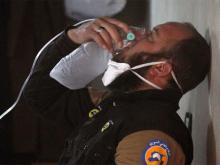
Pope Francis condemned the suspected chemical weapons attack that killed over 100 people in Syria and renewed his call for an urgent political solution to end the war. Speaking at his weekly audience at the Vatican on April 5, the pope said he was horrified by the “unacceptable” massacre of civilians, including at least 20 children, on April 4.

With the blessing of Pope Francis, Cardinal Blase Cupich on April 4 unveiled an anti-violence initiative for this beleaguered city that will be underscored by a Good Friday procession, using the traditional stations of Jesus’ way to the cross to commemorate those who have lost their lives in street violence.
Cupich said he was inviting civic, education, and religious leaders, and “all people of good will,” to take part in the April 14 “Peace Walk” through the heart of the violence-scarred Englewood neighborhood.

A New Jersey teen pleaded guilty to attempting to provide material support to terrorists, in what media called an ISIS-inspired effort to kill Pope Francis in 2015 during a public Mass in Philadelphia, according to a statement by federal prosecutors.
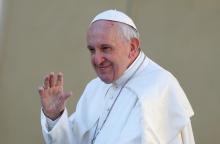
Pope Francis on Wednesday said it was "imperative and urgent" to protect civilians in Iraq, speaking as U.S. investigators looked into who caused an explosion in Mosul that killed scores of non-combatants. Addressing tens of thousands of people at his weekly general audience in St. Peter's Square, Francis said he was "concerned about civilian populations trapped in the neighborhoods of western Mosul."

Pope Francis urged the United Nations on March 28 to seek the "total elimination" of nuclear weapons, speaking as the United States and some other major powers boycotted a conference considering a global ban.
In a message to the conference that started in New York on March 27, Francis called on nations to "go beyond nuclear deterrence" and have the courage to overcome the "fear and isolationism" he said was prevalent in many countries today.
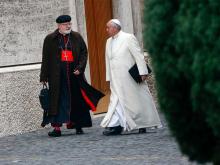
Collins, who was sexually abused by a priest at age 13, resigned on March 1, citing what she called “shameful” resistance to commission proposals from the Vatican’s powerful doctrinal office, which is responsible for pursuing cases against abusive priests and bishops.
Saunders stepped aside after publicly calling for Australian Cardinal George Pell to be dismissed, after news reports surfaced that he had protected pedophile priests in Australia. Pell serves as the Vatican’s finance chief.

He stopped at three small apartments, one of them home to Mihoual Abdel Karim, a Muslim immigrant from Morocco who lives there with his wife and three children. "It was very emotional. It was like having a friend in the house," said Karim, who works at a pharmaceutical factory and whose wife wears the veil.
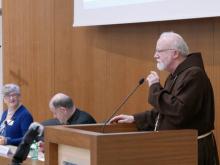
“There is simply no justification in our day for failures to enact concrete safeguarding standards for our children, young men and women, and vulnerable adults,” O’Malley said.
“We are called to reform and renew all the institutions of our church. … And we certainly must address the evil of sexual abuse by priests.”
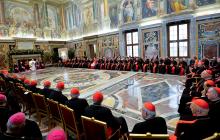
As Pope Francis marks the fourth anniversary of his revolutionary papacy, the pontiff apparently finds himself besieged on all sides by crises of his own making: an open “civil war” in the Catholic Church and fears of schism, mounting opposition from the faithful, and a Roman Curia so furious with his reforms that some cardinals are plotting a coup to topple him.
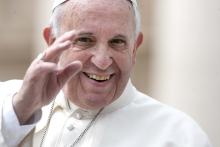
Despite criticism from conservative opponents who question his approach to church doctrine and his reform of the Vatican Curia, the pope said he had never lost his peace of mind.
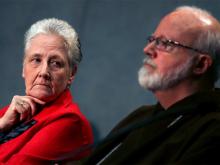
In a major setback for the pope, Collins on Mar. 1 announced that she had resigned from the Pontifical Commission for the Protection of Minors, established by the pontiff in 2013 to counter abuse in the church.
She said the pope’s decision to create the commission was a “sincere move,” but there had been “constant setbacks” from officials within the Vatican.
“There are people in the Vatican who do not want to change, or understand the need to change,” Collins said in a telephone interview from Dublin.

On Feb. 8, Guadalupe Garcia de Rayos went to Mass and said a prayer before voluntarily going to her biannual appointment at the immigration office in Phoenix.
Guadalupe knew that, because of President Trump’s executive order on immigration enforcement, she was now considered a high priority for deportation and could be sent back to Mexico, leaving her two teenage children, both of them U.S. citizens.

Pope Francis has condemned clerical sex abuse as an “absolute monstrosity,” and asked victims and their families for forgiveness on behalf of the Catholic Church.
In an unusual move, the pontiff’s comments were published as a preface to a new book by Daniel Pittet, a Swiss victim who was sexually abused for four years by a priest when he was a child.
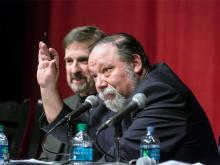
For Catholics, the key to working collaboratively with Pope Francis, on issues from mass migration to climate change to Hispanic evangelization, may be found in a controversial movement that many left for dead long ago: liberation theology.
That message reverberated, from Feb. 6 to Feb. 10, through the halls of Boston College and a nearby retreat center, as nearly 40 theologians gathered from across the Spanish-speaking world to discuss the movement’s future with its founding figures.

The world seems to be witnessing increasing levels of violence, fear, and hatred that challenge us each day. There are ongoing debates about how or whether to welcome immigrants and refugees to the United States; news headlines remind us about the plight of Syria and about the horrors of the Islamic State.
In such times, talk about mercy may seem more like wishful thinking. But mercy matters – now more than ever.

Pope Francis has called for prayers for the Rohingya, the Muslim minority group forced to flee violence and persecution in Myanmar.
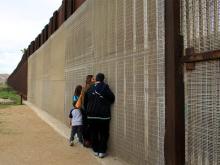
President Trump’s proposed border wall with Mexico raises serious questions about America’s moral standing, as the poor would bear the brunt of the suffering, a leading Catholic theologian says.
The Rev. Daniel G. Groody, an associate professor of theology at Notre Dame University in Indiana, said the wall would lead to a loss of life, as migrants are forced to find other ways to escape poverty across the border.
“What Trump fails to see is that state sovereignty is not an absolute privilege, but a moral responsibility,” said Groody.
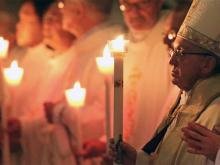
Pope Francis called for greater compassion for refugees and marginalized people less than a week after President Trump ordered a temporary immigration ban from seven predominantly Muslim countries.
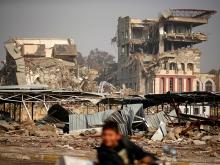
In other comments published Monday, Chaldean Patriarch Louis Raphael I Sako of Baghdad also said Trump’s policy of preferential immigration for Christians was a “trap” and would “create and feed” tensions with Muslims.